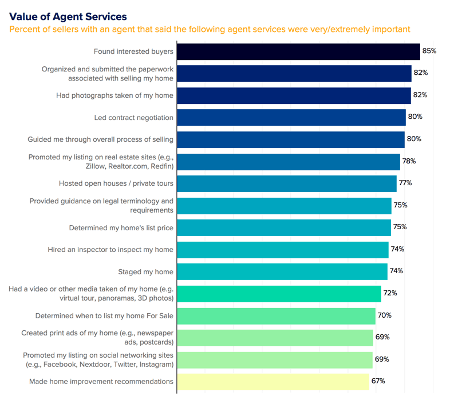How to Find A Real Estate Agent (For Buyers and Sellers)

Our evaluations and opinions are not influenced by our advertising relationships, but we may earn a commission from our partners’ links. This content is created by TIME Stamped, under TIME’s direction and produced in accordance with TIME’s editorial guidelines and overseen by TIME’s editorial staff. Learn more about it.
Buying or selling a home can be an extremely stressful and complicated process. In addition to combing through pages of listings and going to dozens of showings, buying or selling a home comes with a lot of lengthy and confusing paperwork. Even experienced buyers and sellers likely need some help when it comes to navigating the real estate market. That’s why so many people choose to work with a real estate agent.
While some home buyers and sellers might try and tackle the entire process on their own, many choose to enlist the help of a real estate agent to guide them through the home buying or selling process. In fact, according to the 2022 Zillow Group Consumer Housing Trends report, 88% of homeowners choose to list their homes with a real estate agent when the time comes to sell. There are many reasons why so many people choose to work with a real estate agent rather than go it alone.
First and foremost, real estate agents are incredibly knowledgeable about the real estate market. They must be licensed by their state and have to keep up with continuing education to ensure they stay up-to-date with housing trends and other important aspects of the home buying and selling process. Unless you are a licensed real estate agent, you won’t have the knowledge and experience that a real estate agent has.
Additionally, Zillow surveyed sellers who used a real estate agent to list their homes to determine which services their agent provided that were most important to them. The results showed that sellers’ number one priority is to find buyers and lead them through the home sale process, which their real estate agent did for them by listing their property on real estate listing sites, using professional photographs to help the property stand out, and guiding them through the paperwork and legal requirements of selling their home. Zillow’s full findings can be found in the chart below.

Listing a home for sale without the help of a real estate agent requires a lot more hands-on work from the seller. Without an agent, the seller will have to value their home, handle listings and marketing for the home, find potential sellers and guide showings or open houses, and handle all the paperwork and legal requirements themselves. While it’s certainly doable for a homeowner with the time, experience, and patience to manage the entire home selling process, most homeowners will likely benefit from using a real estate agent to help make the selling process go more smoothly.
While searching for a real estate agent, you may also come across the term “broker.” But what are brokers, and how are they different from real estate agents?
Although real estate agents are required by the state where they operate to take and pass a real estate license exam, brokers have gone a step further and undergone additional training. This allows them to sponsor and employ real estate agents or work independently. The benefit of this for the seller is the additional experience and education a broker can bring to the table. The most significant benefit for the broker is that they can take a percentage of a commission from an agent who works for them, which increases their earnings potential.
You might hear the terms “real estate agent” and “Realtor” used interchangeably, but there is a difference between the two. A real estate agent is licensed in their state to assist home buyers and sellers through the process. A Realtor, on the other hand, is a trademarked name for a professional who is a member of the National Association of Realtors (NAR).
In addition, a Realtor could be a real estate agent, but they could also be a salesperson, a broker, a property manager, or an appraiser. To become a Realtor, you must have a current real estate license, be actively working in the business, and meet specific legal and financial requirements. For example, you can’t become a Realtor if you have recently filed for bankruptcy or have a record of unprofessional conduct. Realtors can also take additional training to designate them as specialized in working with certain types of clients, such as the following:
With so many buyers and sellers choosing to work with a real estate agent, you might think it’s easy to find one to represent you. But according to Zillow, 18 percent of sellers said they had trouble finding the right agent. Luckily, it doesn’t have to be hard if you follow these seven simple steps.
Before you search online for real estate agents in your area, ask your local friends or family members whether they can recommend an agent they have worked with in the past. Asking those you trust for referrals can be the best way to find an agent. In fact, Zillow’s most recent research shows that 18% of sellers found their agent by asking friends and family for referrals.
Once you have a few names from friends or family members, it’s time to look them up online. Look at their current listings and check their social media accounts and website. Read online reviews to see what previous clients are saying about them. A few negative reviews are to be expected. Still, if there are more negative than positive reviews, or if the agent doesn’t reply to negative reviews (or worse, responds in a combative manner), you can cross them off your list and move on to the next candidate.
After you’ve vetted some agents online, pick the top three you think might be a good fit and make an appointment to meet with them. Meeting with multiple agents can help you compare and see if you like the communication style of one over another.
When you meet with your shortlisted contenders, ask them questions to get a sense of how they work and how they can help you buy or sell a home. The best real estate agents will welcome questions to help clients understand their process and see if they are a good fit. It’s a good idea to ask about their previous sales, experience working in your neighborhood, work style, and other factors that might come into play while you’re working together. A more detailed list of questions to ask can be found further down in this article.
The next step is to ask your shortlisted agents if they can provide you with references. This way, you can speak with former clients and ask them questions about what it was like actually working with the agent. Most agents will happily provide you with a list of references if requested.
If you have a weird feeling about an agent even after following all the previous steps, it’s best to follow your instincts. After all, you will be working closely with this individual, and if you aren’t entirely comfortable with them, it won’t be a very good working relationship. Crossing a contender that checks all the other boxes off your list is fine, if your gut tells you it’s not a good fit.
Once you’ve vetted potential real estate agents to work with and chosen the one you think will be the best fit, it’s essential to carefully read the contract before signing. The agreement will include the real estate commission, which is the percentage of the selling price the real estate agent will receive in exchange for their work with you.
In most cases, the seller pays the commission, but that may not always be the case, so it’s important for both buyers and sellers to understand the commission percentage. In addition, make sure you review the length of the contract. A contract over six months suggests the agent might not be confident they can sell your house or help you find a new house within that time frame. And if your home is still on the market half a year after being listed, it’s good to have the option to either sign a new contract with your agent or find a new agent to try and sell your home instead.
There are many things to look for when searching for a real estate agent, although some are more important than others. The following are some of the top things to check:
As part of the interview process, it’s essential to ask questions to determine whether or not an agent will be a good fit. Some questions will apply no matter whether you’re buying or selling, while others will only apply to one or the other situation.
The following questions are good for buyers and sellers to ask real estate agents when they are shopping around to find one to help them buy a house or sell a house:
If you’re looking for a real estate agent to help you find and purchase your dream home, the following questions can help you determine whether the agent you’re interviewing is a good fit:
When searching for a real estate agent to help sell your home, it's important to ask the following questions:
Whether buying, selling, or investing in real estate, finding an agent who can represent your needs is vital. By following some simple steps, you can vet potential candidates to find one you trust to listen to and address your questions and concerns while helping you realize your real estate goals.
Finding the right real estate agent to help you buy or sell a home can be stressful. The following are some common questions about finding a real estate agent to help you get matched with someone who can help you reach your goals.
The main alternative to working with a real estate agent is to act as your own agent. The problem with this route is that most home buyers or sellers aren’t experienced with the process or the legal requirements when buying or selling a home. For many, selling a home is the largest transaction they will make in their lifetime, and it can take the burden off to have a professional in your corner to guide you through the process.
If you’re having trouble finding a real estate agent, try asking friends and family for referrals or searching for an agent using a tool like Zillow’s Agent Finder tool or Realtor.com’s Find a REALTOR. You can also contact local agencies and ask if they have an agent who could help you with your home sale. Finding a real estate agent who is a good fit can take time and energy, but it’s definitely worth it in the end.
The typical commission amount for a real estate agent is 6 percent split between the buyer’s agent and the seller’s agent. However, this percentage may be negotiable, so it’s vital to read the contract carefully before signing so you can negotiate. Generally, the seller pays the commission using part of their profit from the sale, but this can depend on what the buyer and seller agree upon in the offer.
It doesn’t really matter. All real estate agents need to be licensed in order to operate in their state. Some real estate agents are National Association of Realtors (NAR) members, which allows them to use the Realtor name. To become a member, an agent must not have a pending or recently filed bankruptcy and cannot have any official sanctions against them for professional misconduct, so choosing a Realtor can give you extra peace of mind about the professional you choose to work with.
The information presented here is created by TIME Stamped and overseen by TIME editorial staff. To learn more, see our About Us page.



